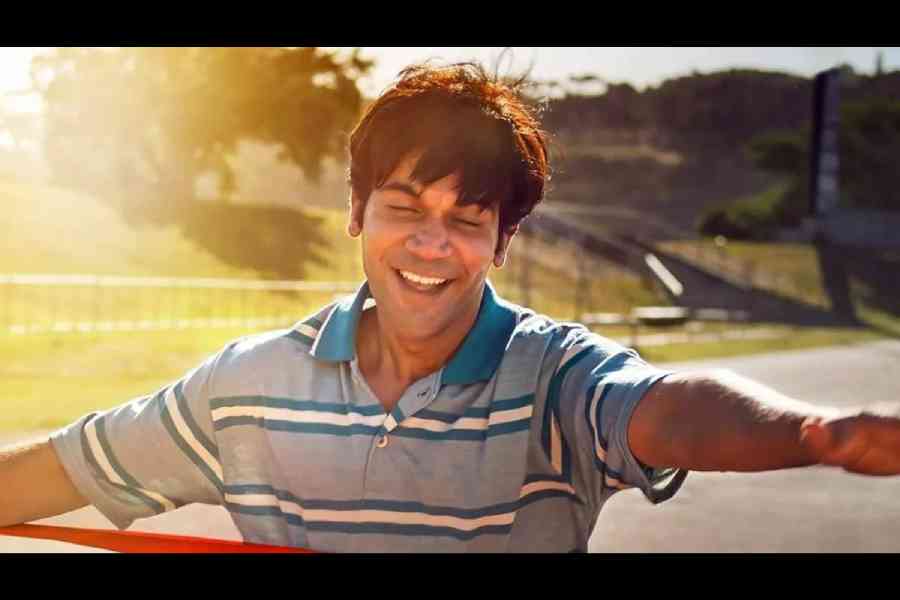As a biopic, Srikanth scores on one major count — even as it focuses on the uplifting, inspirational story of its titular protagonist, it doesn't shy away from showing the grey specks in his character. Srikanth Bolla, played by a terrific Rajkummar Rao, is simple but also complex. Like everyone else, he is capable of hubris and arrogance. He doesn't think twice before letting his words hurt those who care for him. He allows anger to get the better of him. In a genre which tends to whitewash its subject, sometimes to laughable levels (here's looking at you, Sanju!), Srikanth is a courageous exception.
But Srikanth is not so brave in quite a few other aspects. In telling its story of a man, who despite his disability, fought against all odds to carve his place in the world, the film tends to underline every emotion — jubilation, sadness, angst, frustration — with a grating background score that prevents the viewer from feeling them organically and naturally. It is a lazy plot device that Bollywood has always been guilty of resorting to but when it happens in a film like Srikanth, which has so much else to cheer for, it feels like a huge letdown.
What doesn't is Rajkummar and the sincerity — even when his character is not being sincere — that he brings to the part. As Srikanth, a boy born visually impaired into a farmer's family in Andhra Pradesh's Machalipatnam, and whose father, in a moment of weakness and selfishness, tried to kill him when he was less than a day old, Rajkummar, the consummate actor that he is, makes sure that your eyes (pun unintended) are on him whenever he is on screen.
And Srikanth is on screen in almost every frame of the 134-minute film. A brilliant student with an intuitive mind, he doesn't allow his lack of eyesight to come in the way of where he wants to be in life. As a young man, he takes a college — and in a way, the whole education system — to court for not allowing impaired students to enroll in the science stream. Srikanth wins the case and paves the way not only for himself but also for everyone else like him.
His refusal to bow down to the system and his constant need to challenge the status quo is what defines Srikanth Bolla, who at age 32 today, has a number of achievements to his credit, something that the film can't help but tick off in a mechanical fashion, making it seems more like a Wikipedia page in many parts.
Srikanth's close ties with former President APJ Abdul Kalam — who was the first investor in his company — is played out at regular intervals, with an end-credits sequence showing the real-life Kalam addressing a public function where he praises Srikanth. Gullak actor Jameel Khan makes for a convincing Kalam.
What is not so convincing in Srikanth is the portrayal of its female characters. Srikanth's mother remains a character perpetually on the periphery (that the BGM constantly blares out Qayamat Se Qayamat Tak's Papa kehte hain every time Srikanth is within sniffing distance of his latest laurel, is telling). His teacher Devika (played by an assured Jyotika) lends him support and strength every step of the way, but her character seems to exist in a vacuum with no story of its own. The same goes for Swati (Alaya F), who pops in and out as Srikanth's ladylove, without the film showing any interest in developing the character.
Director Tushar Hiranandani — the man behind real-to-reel films like Saand Ki Aankh and Scam 2003 — knows a thing or two about mounting a story drawn from life, but in Srikanth, his focus is so much on crafting a happy, uplifting film that he forgets to keep it real.
Srikanth's journey from 'Sri can't' to 'Sri can' seems a bit too artificial, with the screenplay glossing over what must have been confidence-crushing hurdles to get to where he is today. Life is a cakewalk for Srikanth for the most part and while that may make for a few feel-good moments, as a viewer, you do tend to feel a little shortchanged.
In the end, the film is made watchable by Rajkummar, who gives life even to the stereotyped narrative trope of a "don't pity people like me" lecture at the end. Srikanth's words: "In this country, two per cent people are blind and 98 per cent can't see" hits home, given the times we live in, in more ways than one.











